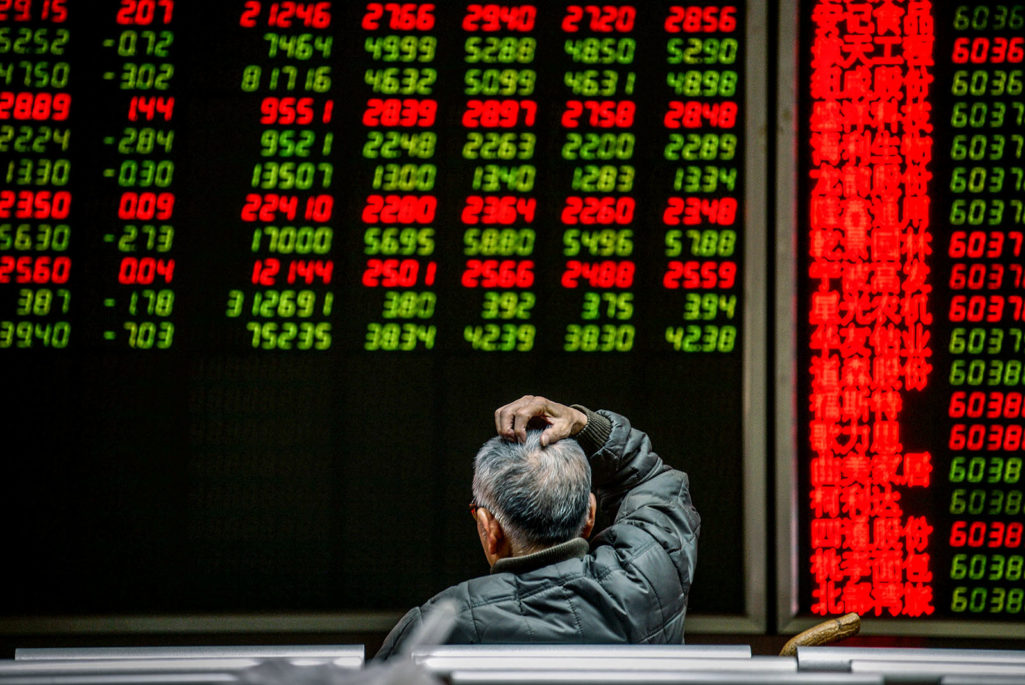Beware the Dragon: The Global Impact of a China Hard Landing

An investor looks at screens showing stock market movements at a securities company in Beijing on January 14, 2016. Shanghai stocks gave up early gains on January 13 to end the morning flat despite a better-than-expected trade report out of China, but Hong Kong rallied.
Photo: Wang Zhao/AFP/Getty Images
Risks to the global economy are rising, according to the vast majority of businesses queried in the recent Oxford Economics Global Risk Survey. Meanwhile, 25 percent of respondents believe that a global downturn or recession is more likely than not.
But the most remarkable result from the survey—which polled some of the world’s largest companies—is the feared trigger for weakness in the global economy: Almost all respondents cite the Chinese economy among their top concerns.
China’s Global Links Run Deep
The perceived importance of China to businesses across the globe is perhaps unsurprising. Its connections to other countries are complex and increasingly powerful. Consider first the impact of China on global commodity markets, given the commodity-intensive nature of the country’s investment-led growth. Against the backdrop of continued strong oil production, increased fears over Chinese prospects have already been associated with major falls in oil and other commodity prices.
While weaker oil prices have traditionally been viewed as a net positive for the global economy—the boost to spending among net energy importers has generally outweighed weakness among net energy exporters—recent history suggests a more nuanced picture at current low oil price levels. Continued falls in oil prices have left some producers in a particularly challenging position. In Saudi Arabia, for example, the government recently unveiled a potentially radical fiscal consolidation program in its 2016 budget.
Expected gains for some net energy importers have also disappointed. In the United States, the domestic energy sector has dragged heavily on both capital expenditure and payroll growth, in part reflecting the behavior of shale oil firms. Indeed, as oil prices have plunged, so has capital expenditure in the U.S. oil and gas extraction sector. The drag on the U.S. economy has been material, with the investment fall knocking 0.4 percentage points off annual growth in 2015.
The significance of China for trade is also unquestionable. China has surpassed the U.S. and the EU as the main export destination for its Asian neighbors. And some of the most reliant on China are commodity producers, leaving them doubly exposed to a weaker Chinese economy.
In addition, severe Chinese weakness would most likely be accompanied by a shock to confidence in the global real economy. That would affect not just countries or businesses with significant direct exposure to China; as the global economy slowed, investment plans would be scaled back more generally, accompanied by slackening household spending.
A China slowdown matters. A hard landing would have a profound effect on the global economy.
Finally, recent market turbulence has highlighted a number of other key channels. A sharp China slowdown would undoubtedly challenge investor sentiment, sparking major shifts in exchange rates, interest rates and an array of other asset prices—with important implications for not only growth in different countries, but also the stance of monetary policy across the globe.
What Happens in China Does Not Stay in China
In a qualitative sense, then, Chinese developments matter. But, quantitatively, how great would the fallout be from a severe China slowdown?
In recent research, my colleague Alessandro Theiss and I sought to answer this question. In particular, we modeled a “hard landing” involving Chinese growth of just 2.5 percent in 2016. That lies far below our central forecast of a limited slowdown and the probability of such a disappointing growth performance is not high. But, should it materialize, the implications for the global economy would be profound.
In the hard landing, global prospects deteriorate as emerging markets and commodity producers sink deeper. But advanced economies are not immune. By 2017, five advanced economies have fallen into recession, and relative to our central forecast, more than 2 percent will be shaved from the world’s total GDP.
Not many can cushion the blow. In a number of advanced economies, monetary policy rates may already be close to their effective floor, even where that floor is negative. In certain emerging market economies, policy is constrained by concerns over sharp capital outflows, depreciation and inflationary pressures. Of the 46 countries we analyzed, only half are able to provide a policy rate response.
The U.S. would be one of the least affected economies in a China hard landing; however, it is by no means immune. On the trade side, China accounts for just 7 percent of U.S. merchandise exports. But emerging markets, which are more directly exposed to Chinese weakness, are responsible for around a third, even excluding Mexico. That is not to mention other linkages from China to the U.S. economy, through capital flows, exchange rates, commodities, confidence and more.
Ahead of the Federal Reserve’s December policy rate hike, I remarked on the potential for a China hard landing to undermine the Federal Reserve’s plans to steadily increase interest rates in 2016 and beyond. If such an event were to unfold, I argued, the first rate rise in the nascent Fed policy-tightening cycle would also—for a while at least—be the last. As events of recent weeks have borne out, that remains very much the case.
Beware the Dragon?
In short, there is little doubt that a China slowdown matters. A hard landing would have a profound effect on the global economy. It would weigh heavily on emerging markets and advanced economies would not be immune.
But the precise scale of these impacts is uncertain. Pessimists, for example, might conceive of a more extreme China hard landing scenario or a more moderate slowdown accompanied by a series of other blows to the global economy.
Equally, optimists can point to the possibility that a far greater policy response would greet a major shock to Chinese activity. In China, the authorities might seek to counterbalance the slowdown more actively through expansionary fiscal measures and encouraging greater bank lending. Elsewhere, additional unconventional measures could be countenanced by various central banks across the world.
Moreover, it is important to place this risk in context. While we have anticipated a China slowdown for some time, our central expectation is that further slowing will be relatively limited. The risks to Chinese growth are substantial—but there may be fire in the dragon just yet.




